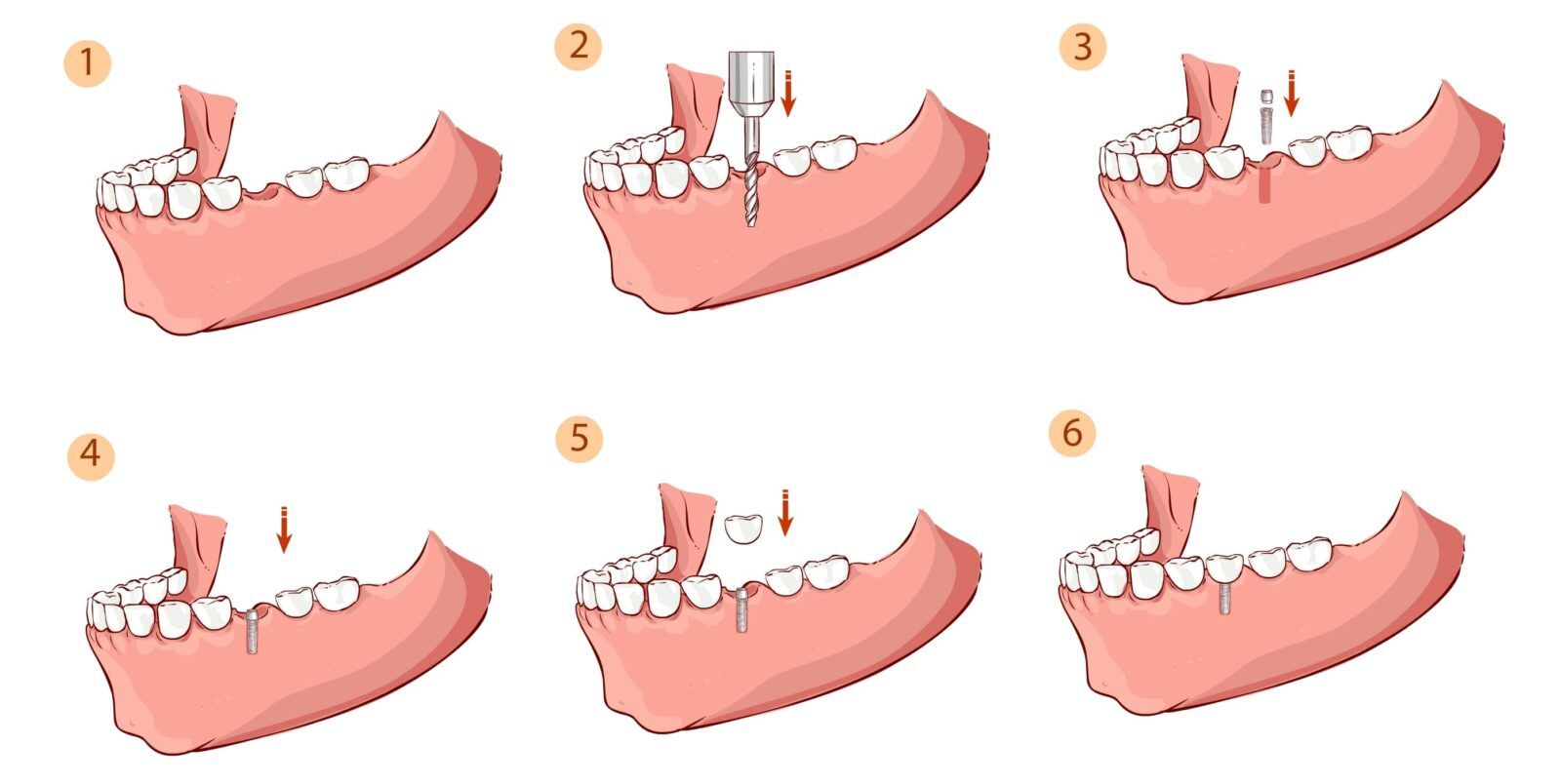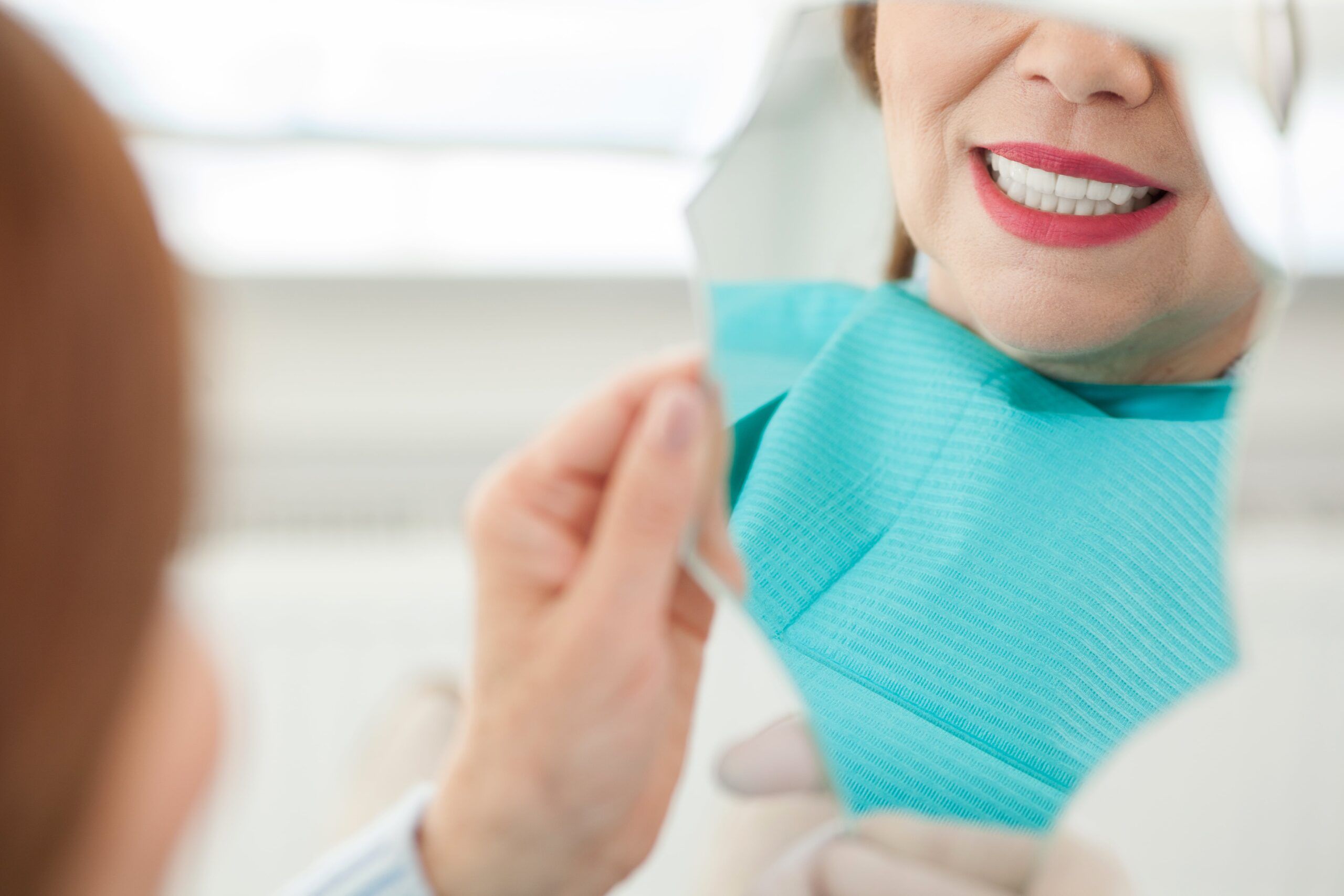The decision to undergo dental implant surgery marks a significant step towards restoring both your oral health and confidence in your smile. Dental implants offer a long-lasting and effective solution for replacing missing teeth, but like any surgical procedure, they require a period of recovery. Understanding what to expect during the recovery process can alleviate any apprehensions you may have and ensure a smoother healing journey. In this blog, we’ll guide you through the phases of recovery after dental implant surgery, providing tips and insights to help you regain your smile with ease.
The Dental Implant Process
Here are the typical steps involved in dental implant surgery:

- Initial Consultation and Examination: Your dentist or oral surgeon will assess your oral health, take X-rays, and possibly use 3D scans to determine if you’re a suitable candidate for dental implant surgery. They will discuss the procedure, address any questions you have, and develop a treatment plan.
- Anesthesia: On the day of the surgery, local anesthesia or dental sedation will be administered to ensure your comfort during the procedure.
- Incision: A small incision is made in the gum tissue where the implant will be placed, exposing the underlying jawbone.
- Drilling: Using specialized drills, the oral surgeon creates a precise hole in the jawbone to accommodate the implant.
- Implant Placement: The titanium implant, resembling a screw, is carefully inserted into the drilled hole. It acts as a replacement for the tooth root.
- Closing the Incision: Once the implant is in place, the gum tissue is sutured back over the implant. In some cases, a cover screw or healing cap may be placed to protect the implant during healing.
- Osseointegration: Over the next several months, osseointegration occurs as the implant fuses with the surrounding jawbone, providing a stable foundation.
- Abutment Placement: After osseointegration is complete, a small connector piece called an abutment is attached to the implant. This serves as a platform for the prosthetic tooth.
- Impressions: Dental impressions are taken to create a custom-made crown that will perfectly match your natural teeth.
- Crown Placement: The final step involves attaching the custom-designed crown to the abutment. This crown is shaped and shaded to seamlessly blend with your existing teeth.
Throughout the entire process, your dentist or oral surgeon will provide guidance, monitor your healing progress, and ensure that the implant integrates successfully. The result is a restored smile that functions and appears natural.
Immediate Post-Surgery Care
The first 24 to 48 hours after dental implant surgery are crucial for a successful recovery. You may experience some discomfort, swelling, and mild bleeding during this time. Your dentist will likely prescribe pain medications and antibiotics to manage pain and prevent infection. Here’s how you can enhance your immediate post-surgery care:
- Rest: Allow your body to recover by getting adequate rest. Avoid strenuous activities for a few days.
- Cold Compress: Applying a cold compress to the swollen area in 15-minute intervals can help reduce swelling and discomfort.
- Soft Diet: Stick to a soft and bland diet during the initial days. Opt for soups, smoothies, mashed potatoes, and yogurt to avoid putting excessive pressure on the surgical site.
Oral Hygiene and Maintenance
Maintaining proper oral hygiene is crucial during the recovery period to prevent infection and ensure the success of your dental implant. However, it’s essential to be gentle around the surgical area. Here’s how to maintain oral hygiene while recovering:

- Gentle Brushing: Brush your teeth gently using a soft-bristle toothbrush. Avoid brushing directly on the surgical site for the first few days. As healing progresses, you can gradually brush near the implant site using gentle, circular motions.
- Rinsing: After the first 24 hours, rinse your mouth with a mild saltwater solution as recommended by your dentist. This helps keep the surgical area clean and promotes healing.
- Avoid Tobacco: If you smoke or use tobacco products, refrain from doing so during the healing process. Tobacco can interfere with the healing of the surgical site and increase the risk of complications.
- Soft Diet: Stick to a soft diet for the initial days following surgery to prevent unnecessary stress on the implant site. Gradually introduce regular foods as your comfort level improves.
- Oral Hygiene Routine: Continue your regular oral hygiene routine for the rest of your mouth, including flossing and brushing the surrounding teeth. Be gentle around the surgical area.
- Antimicrobial Mouthwash: Your dentist may recommend using an antimicrobial or prescription mouthwash to reduce the risk of infection. Follow their instructions for use.
- Avoid Hard Foods: Steer clear of hard, crunchy, or sticky foods that could put undue pressure on the implant site. This precaution helps prevent implant movement during the critical healing phase.
- Follow Dentist’s Instructions: Always adhere to the post-surgery instructions provided by your dentist or oral surgeon. These instructions are tailored to your specific situation and are crucial for a successful recovery.
- Scheduled Follow-Ups: Attend all scheduled follow-up appointments with your dentist. These visits allow your dentist to monitor the healing process, make any necessary adjustments, and ensure the implant is integrating as expected.
- Maintain Overall Health: A balanced diet, adequate hydration, and proper sleep contribute to your body’s ability to heal effectively. Follow a healthy lifestyle to support your recovery.
Stitches and Healing
Depending on your case, your dentist might use dissolvable stitches that disappear on their own or require removal after a week or two. It’s essential to follow your dentist’s instructions regarding stitch care:
- Avoid Disturbing Stitches: Be cautious not to pull, poke, or disturb the stitches while eating or cleaning your mouth.
- Scheduled Follow-ups: Attend all scheduled follow-up appointments to allow your dentist to monitor your healing progress and make any necessary adjustments.
Long-Term Care
As the days pass, you’ll likely begin to feel better. It’s important to remember that everyone’s recovery timeline is different, but typically after the first week, you can start incorporating more solid foods into your diet and resuming light activities. However, continue to avoid hard or crunchy foods that could put unnecessary pressure on the implant site.
While you’ll be well on your way to recovery after the initial healing phase, long-term care for your dental implant is essential to ensure its longevity and success:
- Regular Dental Visits: Keep up with your regular dental check-ups and cleanings. Your dentist will monitor the implant and surrounding area for any issues.
- Oral Hygiene: Maintain excellent oral hygiene by brushing, flossing, and using an antimicrobial mouthwash as recommended by your dentist.
- Healthy Lifestyle: A balanced diet and healthy lifestyle contribute to overall oral health and the success of your dental implant.
In Conclusion
Recovering from dental implant surgery might seem like a journey, but with proper care and patience, you’ll soon be enjoying the benefits of a complete and beautiful smile. Remember that your dentist is your best resource for guidance throughout your recovery. By following their instructions, maintaining oral hygiene, and giving your body the time it needs to heal, you’ll be well on your way to embracing your renewed confidence and improved oral health.




